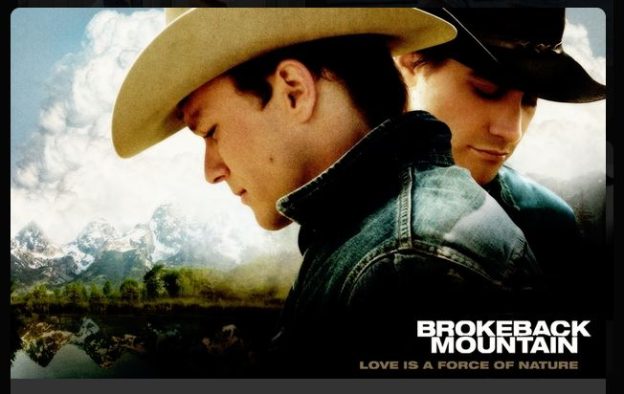Once interesting and iconoclastic, all gays seem to crave now is the State’s pension and seal of approval. They ought to go back to the days of the Stonewall Riots, when the police’s violations of privacy—and private property—were the object of their anger and activism ~ilana
At the time, I avoided “Brokeback Mountain,” the film about two, bareback-riding cowboys (I discovered what that meant by reading about Andrew Sullivan’s alleged, online sexual cruising).
As a rule, I see very few films. I used to love the cinema, but that was before the motion picture industry forsook good scripts and well-developed characters for storylines fit for a stun-gunned audience, with the attention span of a nit, and an ability to focus only on fast-moving or imploding animated objects and characters as flat as pancakes.
If it’s not an orgy of special effects, then it’s a succession of vapid chick flicks, featuring toothy tarts like Jessica Alba or Jake Gyllenhaal.
For me, the highlight of the insufferably pompous Academy-Awards ceremony was when members of the band Hustle & Flow burst onto the stage, and pierced the rarified atmosphere with, “It’s Hard Out Here for a Pimp.”
Hollywood’s anointed were appalled, flabbergasted. They had gathered to congratulate themselves for the visionary “Brokeback Mountain.” Instead, the sacramental moment was sullied by rude, crude and politically incorrect hip-hop. Hurray!
The sterile smugness was punctured again when “Crash,” which I had seen, crushed “Brokeback,” and was crowned Best Motion Picture. “Crash” was over-the-top, but generally inoffensive. The forced attempt to be out-of-the mold yielded the opposite effect: a highly stylized effort.
Later on, a lemon-faced Lee (Brokeback’s director), and a posse of sore losers, including author Annie Proulx, complained about bigotry. The academy, they claimed, had rear ended their hopes for an award because of a “rural bias.” Does this mean Hollywood will exit its echo chamber to make a film in praise of rube hicks? We’ll see.
Movies with a message are especially irksome. Because the people involved in movie making are much less talented nowadays (not an implausible thesis, and perfectly compatible with Charles Murray’s in his monumental, “Human Accomplishment: The Pursuit of Excellence in the Arts and Sciences, 800 B.C. to 1950”), and because they think in clumsy clichés, the overall effect on the viewer is that of a giant wagging, prodding finger.
They get in your face and stay there—for two hours, plus. I’d take an action film like “Flight Plan,” starring Jodie Foster, any day over “Lord of War” with Nicholas Cage, where the voice-over serves as a constant reminder of who is “Running with the Devil”; and who is on the side of the angels.
Peggy Noonan has said succinctly that “Orson Welles was an artist. George Clooney is a fellow who read an article and now wants to tell us the truth, if we can handle it.” Clooney or Lee—it’s all the same to me. To pay for a two-hour-long sermon from a pea brain, in the guise of entertainment, is not my cup of tea.
Which is why I avoided “Brokeback.” To be fair, film has almost always come with a moral. “Deliverance” had a message. So did “Midnight Express,” but it was incidental to a superb story. Billy Hayes told his inhuman and inhumane Turkish jailers that “the concept of a society is based on the quality of its mercy, of its sense of fair play, its sense of justice.”
Hayes’ far-from-delighted Turkish tormentors also heard this: “For a nation of pigs, it’s funny you don’t eat them.” Try getting that past the ‘daring’ Ang Lee—or other consensus keepers in the Dar al-Islam that is Hollywood.
It so happened that circumstances combined to render me a captive audience. “Brokeback” was being screened on my BA flight back from the Britain, last month. I twitched through some of it, before going back to my book.
Heath Ledger as Ennis (an unfortunate name) Del Mar tried to emulate Marlon Brando’s potato-in-the-cheek mumbling in “The Godfather.” A bad idea then—and now. The “love scene” between the two men was akin to a bear fight. And as sensuous (contrast it with the artful and achingly sad scene in “Midnight Express”). The only sympathetic and authentic character was Alma Del Mar, the betrayed wife (portrayed by Michelle Williams), and her castaway kids.
That gays have such a vested interest in this dreary and dull film indicates that, like Hollywood, they too have become colossal bores. Once interesting and iconoclastic, all gays seem to crave now is the State’s pension and seal of approval. They ought to go back to the days of the Stonewall Riots, when the police’s violations of privacy—and private property—were the object of their anger and activism.
More poignantly, if, in Ayn Rand’s magnificent words, “civilization is the progress toward a society of privacy,” then sexual activism or exhibitionism—homo or hetero—is anathema. All in all, it’s most regrettable that the closet has come to signify oppression rather than discretion.
©2006 By Ilana Mercer
WorldNetDaily.com
June 9
CATEGORIES: Film, Gay Issues, Hollywood, Homosexuality, Sex & Sexuality

 print
print